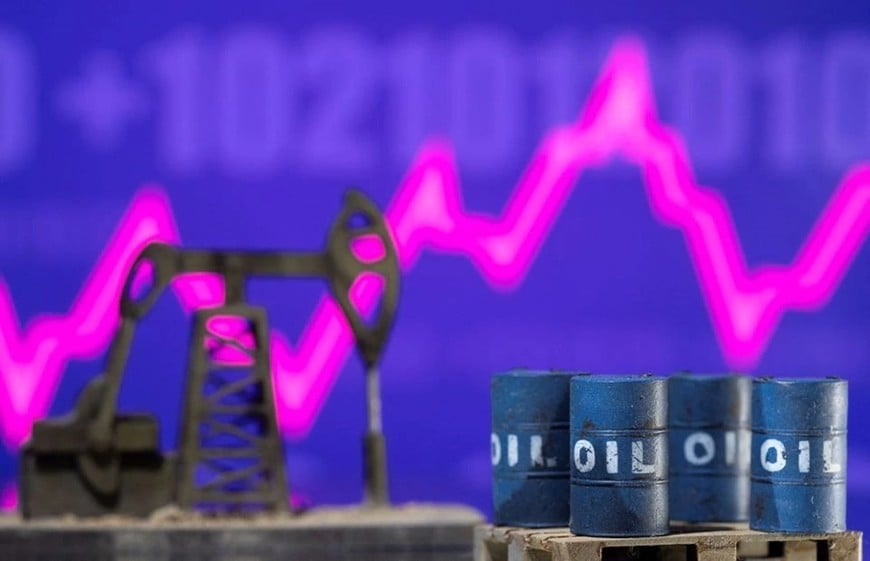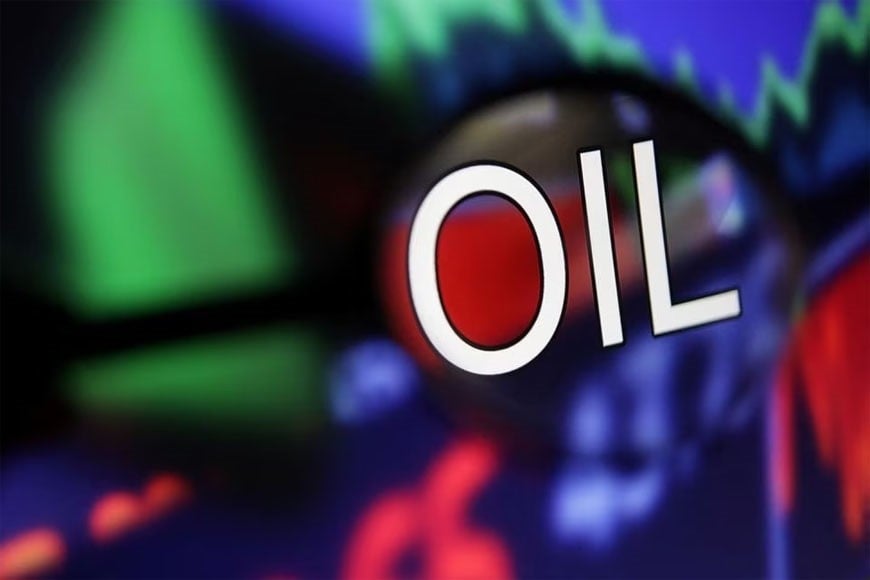World oil prices have increased sharply due to escalating tensions in the Middle East. Domestically, gasoline prices have been adjusted to increase simultaneously.
Oil prices rose sharply on June 13 after Israel and Iran launched retaliatory airstrikes, raising concerns among investors that the conflict could seriously disrupt oil exports from the Middle East.
According to Reuters, at the end of the trading session on June 13, Brent oil price reached 74.23 USD/barrel, up 4.87 USD/barrel, equivalent to 7.02%, at one point during the session it skyrocketed by more than 13%, peaking at 78.50 USD/barrel - the highest level since January 27.
WTI crude oil prices ended the session at $72.98/barrel, up $4.94/barrel, equivalent to 7.62%. During this trading session, WTI crude oil prices jumped more than 14% to $77.62/barrel - the highest level since January 21.
Both Brent and WTI crude oil futures recorded their biggest one-day price swings since 2022, when Russia launched a special military operation in Ukraine that sent global energy prices soaring.

Reuters reported that the Israeli government announced that it had attacked Iran's nuclear facilities, ballistic missile factories and military commanders on June 13, opening a military campaign that it warned would be long-term to prevent Iran from building nuclear weapons. Iran vowed a strong response.
Shortly after the market closed yesterday, multiple media outlets reported that Iranian missiles had hit several buildings in Tel Aviv, Israel. Multiple explosions were also reported in southern Israel.
US President Donald Trump has called on Iran to negotiate over its nuclear programme to stop further “planned” attacks.
The National Iranian Oil Refining and Distribution Company (NIORDC) said the country's oil refining and storage facilities were operating normally and were not damaged.
Iran, a member of the Organization of the Petroleum Exporting Countries (OPEC), currently produces about 3.3 million barrels of oil and fuel per day and exports more than 2 million barrels per day. According to Reuters, analysts say the spare capacity of OPEC and its partners to compensate for any disruption is only about the same as Iran's output.

Tensions in the Middle East have also raised market concerns about the potential disruption of operations in the Strait of Hormuz - a strategic shipping route vital to the global energy industry.
“Saudi Arabia, Kuwait, Iraq and Iran are all heavily dependent on the Strait of Hormuz for their oil exports,” Rabobank said in a recent report.
About a fifth of global oil consumption, equivalent to 18-19 million barrels per day, passes through the Strait of Hormuz. According to Reuters, experts also warned that Iran could pay a high price if it blocked the Strait of Hormuz.
“Iran’s economy depends heavily on the free movement of goods and ships through this sea route, with all of its oil exports coming by sea. Blocking the Strait of Hormuz would be against Iran’s own interests,” analysts from JP Morgan bank analyzed.
Israel has so far avoided attacking Iran's energy infrastructure, including Kharg Island, which accounts for about 90 percent of Iran's crude oil exports, said Ben Hoff, a commodities expert at Societe Generale.
Domestic gasoline prices
Domestic retail prices of gasoline on June 14, specifically as follows:
| E5 RON 92 gasoline is not higher than 19,462 VND/liter. RON 95-III gasoline is not higher than VND 19,967/liter. Diesel oil is not higher than 17,700 VND/liter. Kerosene is not higher than 17,511 VND/liter. Fuel oil is not higher than 16,461 VND/kg. |
The above domestic retail prices of gasoline and oil were adjusted by the Ministry of Finance - Industry and Trade in the price management session on the afternoon of June 12. In this adjustment, domestic gasoline and oil prices increased simultaneously. The price of E5 RON 92 gasoline increased by 199 VND/liter, the price of RON 95-III gasoline increased by 269 VND/liter, the price of diesel oil increased by 280 VND/liter, the price of kerosene increased by 227 VND/liter and the price of fuel oil increased by 283 VND/kg.
In this operating period, the Ministry of Industry and Trade - Ministry of Finance did not set aside or use the Petroleum Price Stabilization Fund for E5 RON 92 gasoline, RON 95 gasoline, diesel oil, kerosene, and fuel oil.
Source: https://baolangson.vn/gia-xang-dau-hom-nay-14-6-tang-vot-5050053.html




































































































Comment (0)